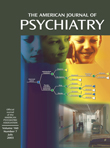Tourette’s-Like Syndrome and Dementia
Mr. A, a 79-year-old man with a 5-year history of frontal-temporal dementia, had developed disturbing tic-like behavior, consisting of slapping his forearm while grunting and swearing. This occurred many times per hour, generally without provocation, and was sufficiently disturbing that he and his wife were threatened with eviction by their landlord. He had been unable to tolerate a trial of haloperidol and had not responded to olanzapine or to quetiapine, the latter at 200 mg/day. Other behavioral problems included sexual disinhibition directed exclusively toward his wife and purposeless wandering. There was no evidence of mood disorder or psychosis.Mr. A’s past medical and psychiatric history was unremarkable, and there was no prior history of tics. He had a remote history of moderate alcohol consumption. He was taking no medications. There was no family history of psychiatric or neurological illness. Upon a mental status examination, he exhibited a labile affect with clear witzelsucht. He was disoriented and amnestic, but his language was neurologically intact. He performed poorly on a test of controlled word fluency and showed paratonic rigidity bilaterally. A computerized tomography scan showed prominent frontal and anterior temporal atrophy. His sexual disinhibition was treated successfully with paroxetine, 40 mg/day, but this had no effect on his tic-like behavior. He was ultimately treated with clonidine, which was titrated without incident to 0.6 mg/day. This resulted in sustained, almost complete remission of the behavior over the past 5 months.
References
Information & Authors
Information
Published In
History
Authors
Metrics & Citations
Metrics
Citations
Export Citations
If you have the appropriate software installed, you can download article citation data to the citation manager of your choice. Simply select your manager software from the list below and click Download.
For more information or tips please see 'Downloading to a citation manager' in the Help menu.
There are no citations for this item
View Options
View options
PDF/ePub
View PDF/ePubGet Access
Login options
Already a subscriber? Access your subscription through your login credentials or your institution for full access to this article.
Personal login Institutional Login Open Athens loginNot a subscriber?
PsychiatryOnline subscription options offer access to the DSM-5-TR® library, books, journals, CME, and patient resources. This all-in-one virtual library provides psychiatrists and mental health professionals with key resources for diagnosis, treatment, research, and professional development.
Need more help? PsychiatryOnline Customer Service may be reached by emailing [email protected] or by calling 800-368-5777 (in the U.S.) or 703-907-7322 (outside the U.S.).

